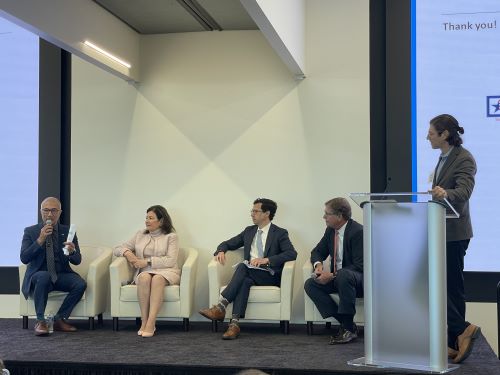Finding the Rational Middle on DACA
As the new year gets underway, the filmmakers at The Rational Middle are digging into more aspects of immigration policy that have proven politically difficult if not impossible thus far.
Case in point: DACA, or the Deferred Action for Childhood Arrivals, program made possible through an executive order signed by then-President Barack Obama back in 2012 following years of inaction by Congress.
In the latest edition of their immigration documentary series, this one entitled "DACA and the American Dream," filmmakers Gregory Kallenberg and Loren Steffy note "hundreds of thousands of 'Dreamers' have come out of the shadows using DACA," but “now, under a new regime, the economic benefit these young people bring, as well as the trust they placed in us as a country, are at stake."
Calling many of them "unwilling migrants," Elisa Steglich, Immigration Clinical Professor, University of Texas at Austin, is quoted in the film as saying "they are people who would have loved to remain in their home countries."
Steglich argues that “violence, lack of education, lack of ability to provide for their family...the circumstances really are the pressure to leave rather than a desire to come.”
The film documents the fallout from the amnesty program signed into law by then-President Ronald Reagan in the 1980s, leading to a situation in which not only were undocumented immigrants largely those who chose to break the law but also many children who were brought into the country when they were very young.
Victoria DeFrancesco Soto, Social Policy Professor, LBJ School of Public Affairs, says the proposal for a so-called "Dream Act," rather than a broader immigration reform plan, was first put forward in 2001 largely because "the idea of a generalized amnesty, everybody knew that was, politically, too difficult to touch."
But the Dream Act, very popular with most Americans, has stalled in Congress as the political parties have become more beholden to their bases. During two years of unified Democratic government starting in 2009, the majority party spent its political capital passing the Affordable Care Act, leading President Obama to create DACA through an executive order after he lost control of Congress in the 2010 elections.
So, who exactly are the people in this program with strict guidelines and are they on a path to citizenship? The filmmakers put that question to Tony Payan, Director of the Mexico Center, Baker Institute at Rice University in Houston.
"They're not quite undocumented because they have received a document that allows them to be in the United States," said Payan. "In some sense, they have a status that looks a little bit like permanent residence but they're not residents," he said. "Their lives are always temporary. These people are not on a path to anything."
The film also explores the legal fight unfolding now following President Donald Trump’s announcement that DACA would be rescinded and examines the legal arguments on both sides.
However the court challenge plays out, many agree Congress should eventually change the laws to allow these young people to stay in the only country they've ever known and pursue careers, adding to the nation's dynamic economy.
"We've invested in these young people," said Dan Griswold, a Senior Research Fellow at the Mercatus Center at George Mason University and Co-Director of its Trade and Immigration Project. "To send them back would be to take that investment in human capital that we've made that's here in the United States – fully Americanized and adjusted and contributing productively in our workforce – to other countries they don't even know would be a foolish waste of important resources."
Check out the entire video below.








